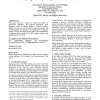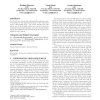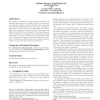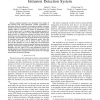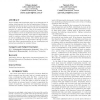81
Voted
HT
2005
ACM
15 years 8 months ago
2005
ACM
This paper describes how the XML based RSS syndication formats used in weblogs can be utilized as the distribution medium for geo-spatial hypermedia, and how this approach can be ...
60
Voted
HT
2005
ACM
15 years 8 months ago
2005
ACM
123
Voted
HT
2005
ACM
15 years 8 months ago
2005
ACM
In recent years, many algorithms for the Web have been developed that work with information units distinct from individual web pages. These include segments of web pages or aggreg...
240
Voted
HT
2005
ACM
15 years 8 months ago
2005
ACM
This paper describes a method to analyze the history of hypermedia collections. We gathered information about documents using the Internet Archive’s Wayback Machine. Analysis fo...
111
Voted
HT
2005
ACM
15 years 8 months ago
2005
ACM
Conversion between different adaptive hypermedia systems has barely been proposed, yet alone tested in realistic settings. This paper presents the evaluation of the interoperabili...
98
Voted
HT
2005
ACM
15 years 8 months ago
2005
ACM
Vox Populi is a system that automatically generates video documentaries. Our application domain is video interviews about controversial topics. Via a Web interface the user select...
125
Voted
HT
2005
ACM
15 years 8 months ago
2005
ACM
We describe our approach to the automatic generation of argument structures in the domain of video documentaries. Our approach releases control of the final video sequencing from...
114
Voted
HT
2005
ACM
15 years 8 months ago
2005
ACM
— Spatial hypertext was developed from studies of how humans deal with information overflow particularly in situations where data needed to be interpreted quickly. Intrusion det...
130
Voted
HT
2005
ACM
15 years 8 months ago
2005
ACM
We describe Eureka, a file system search engine that takes into account the inherent relationships among files in order to improve the rankings of search results. The key idea b...
101
click to vote
HT
2005
ACM
15 years 8 months ago
2005
ACM
Active reading and hypermedia usage are an integral part of scholar daily practices, but the full exploitation of their potentialities still lies far ahead. In the search for new ...

